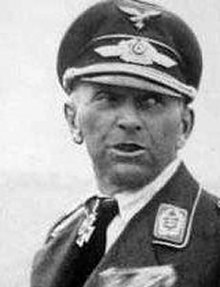Bruno Bräuer
This article needs additional citations for verification. (March 2016) |
Bruno Bräuer | |
|---|---|
 | |
| Born | 4 February 1893 Willmannsdorf, Silesia, Kingdom of Prussia, German Empire now Stanisławów, Lower Silesian Voivodeship, Poland |
| Died | 20 May 1947 (aged 54) Athens, Greece |
| Cause of death | Execution by firing squad |
| Allegiance | |
| Service/ | Luftwaffe |
| Rank | General der Fallschirmtruppe |
| Commands held | "Fortress Crete" |
| Battles/wars | World War I World War II |
| Awards | Knight's Cross of the Iron Cross |
Bruno Bräuer (4 February 1893 – 20 May 1947) was a general in the paratroop forces of Nazi Germany during World War II. He served as a commander on Crete (called Fortress Crete by the Germans) and then commanded the 9th Paratroop Division. After the war, he was convicted of war crimes and executed, along with Friedrich-Wilhelm Müller, on the anniversary of the Axis invasion of Crete.
World War II
In November 1942 Bräuer replaced General
In January 1945, the
Conviction and execution
After his capture by the British he was extradited to Greece for the deportation of the Cretan Jewish Greeks in May 1944 and put on trial there.
Awards
- Iron Cross (1914) 2nd Class (15 October 1914) & 1st Class (1 April 1917)[5]
- Clasp to the Iron Cross (1939) 2nd Class (20 October 1939) & 1st Class (23 May 1940)[5]
- Knight's Cross of the Iron Cross on 24 May 1940 as commander of Fallschjäger-Regiment 1[6]
- German Cross in Gold on 31 March 1942 as commander of Fallschjäger-Regiment 1[7]
References
Citations
- ^ [Die Erde über den Gräbern bewegt sich noch Die Zeit, 20 November 1987]
- ^ Tullia Santin: Der Holocaust in den Zeugnissen griechischer Jüdinnen und Juden (= Zeitgeschichtliche Forschungen. Band 20). Duncker & Humblot 2003, ISBN 3-428-10722-5. Berlin, Freie Univ., Diss., 2001 Santin, p. 26.
- ^ "Some Noteworthy War Criminals" Archived April 1, 2012, at the Wayback Machine (archived here), Source: History of the United Nations War Crimes Commission and the Development of the Laws of War, United Nations War Crimes Commission. London: HMSO, 1948, p. 526, updated 29 Jan 2007 by Stuart Stein (University of the West of England), accessed 22 January 2010
- ^ Beevor, Berlin, the downfall 1945, p. 236
- ^ a b Thomas & Wegmann 1986, p. 33.
- ^ Scherzer 2007, p. 238.
- ^ Patzwall & Scherzer 2001, p. 57.
Bibliography
- Beevor, Antony (1991). Crete, the battle and the resistance
- Beevor, Antony (2002). Berlin, the downfall 1945, Penguin Books, ISBN 0-670-88695-5
- Patzwall, Klaus D.; Scherzer, Veit (2001). Das Deutsche Kreuz 1941 – 1945 Geschichte und Inhaber Band II [The German Cross 1941 – 1945 History and Recipients Volume 2] (in German). Norderstedt, Germany: Verlag Klaus D. Patzwall. ISBN 978-3-931533-45-8.
- Scherzer, Veit (2007). Die Ritterkreuzträger 1939–1945 Die Inhaber des Ritterkreuzes des Eisernen Kreuzes 1939 von Heer, Luftwaffe, Kriegsmarine, Waffen-SS, Volkssturm sowie mit Deutschland verbündeter Streitkräfte nach den Unterlagen des Bundesarchives [The Knight's Cross Bearers 1939–1945 The Holders of the Knight's Cross of the Iron Cross 1939 by Army, Air Force, Navy, Waffen-SS, Volkssturm and Allied Forces with Germany According to the Documents of the Federal Archives] (in German). Jena, Germany: Scherzers Militaer-Verlag. ISBN 978-3-938845-17-2.
- Thomas, Franz; Wegmann, Günter (1986). Die Ritterkreuzträger der Deutschen Wehrmacht 1939–1945 Teil II: Fallschirmjäger [The Knight's Cross Bearers of the German Wehrmacht 1939–1945 Part II: Paratroopers] (in German). Osnabrück, Germany: Biblio-Verlag. ISBN 978-3-7648-1461-8.
